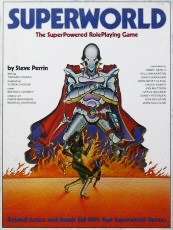Superworld
|
Superworld cover | |
| Designer(s) |
Steve Perrin Steve Henderson |
|---|---|
| Publisher(s) | Chaosium |
| Publication date | 1983 |
| Genre(s) | Superhero fiction |
| System(s) | Basic Role-Playing |
Superworld is a superhero-themed role-playing game published by Chaosium in 1983. Written by Basic Role-Playing and RuneQuest author Steve Perrin, Superworld began as one third of the Worlds of Wonder product, which also included a generic fantasy setting, "Magic World", and a generic science fiction setting, "Future World", all using the same core Basic Role-Playing rules. Only Superworld became a game in its own right.
Game system
Superworld is based on the traditional Chaosium Basic Role-Playing system augmented by super-powers.[1]
Seven characteristics (Strength, Constitution, Size, Intelligence, Power, Dexterity, Appearance) are rolled with dice (2D6+6, rather the 3d6 used for many other Basic Role-Playing games.) The sum of these characteristics gives a total of Hero Points used to buy super powers.
The super powers system follows the Champions model of powers that are described by their effects. For example, one does not buy "Laser Vision", but the effect "Energy Blast" and specifies that it is a laser emitted by the hero's eyes. Each effect can be modified by Advantages (less energy expenditure, for example) or Disadvantages (reduced number of uses, for example) which increase or reduce the cost of a power.
Hero Points can also be used to buy skills or increase characteristics. It is possible to get more Hero Points for character creation by choosing Disabilities for the character, such as Public Identity, Vulnerability to a Substance, Psychological Problems, etc. More Hero Points would be awarded for experience at the end of a game session.
The system functions in the same way as the other Basic Role-Playing games, by rolling percentile dice against skills. Lower rolls than needed can cause increased effect from Specials (equivalent to Impales in RuneQuest), or Criticals, and high rolls can cause critical failures (Fumbles). Combat rules have many options and take into account three types of energy for damage: Kinetic, Electric, and Radiation.
Game materials
The game box contains three rules booklets, a booklet of character sheets, one of tables for the Gamemaster, a page of cardboard figure silhouettes to be cut out, and a set 6, 8, and 20-sided dice. 1984 printings also contains a 4-page errata booklet.
- The "Superheroes Book" (32 pages) contains character creation rules, the game system itself, and two character sheets with a male and female standing silhouette.
- The "Superpowers Book" (40 pages) describes the Powers available to the characters, Advantages and Disadvantages that can be applied to them, and Disabilities that can affect the character. The interior covers have two more character sheets, this time with silhouettes of a male and female in flight.
- The "Gamemasters Book" (40 pages) advises the GM on various aspects of a campaign, the legal system, animals, and the creation of organizations adapted to a superhero universe, with three specific examples: FIRE for Free Investigatory Research Enterprise, FORCE for Federal Organization for the Registration and Certification of Exotics, and the Omega Institute. The "Gamemasters Book" also includes two scenarios: "Deadly Devices of Doctor Dread", which pits a team of heroes against the Dr. Dread of the title and his subordinates, and "The Haunting", which describes a mysterious and ancient volume desired by a mystical super-villain.
Supplements

Bad Medicine for Dr. Drugs
(1984) Scenario. Author: Ken Rolston. Set in a high school, and designed for teenage characters. It comes with six young pregenerated heroes, or lets players use their own. Beginning with the funeral of one of their friends, it sets the heroes on the track of a drug distribution network in their school, directed by the aforementioned Dr. Drugs.
It also includes rules for the creation and management of adolescent characters that have just discovered their powers, and a plan of Warren G. Harding High School, though the scenario recommends substituting the school in which the GM and the players studied.
Superworld Companion
(1985) Rules supplement. Many authors: Stephen R. Marsh, Stephen Perrin, Ian Lee Starcher, Anthony Affronti, Jimmy Akin II, William A Barton, Norman Doege, Bruce Dresselhaus, Ray Greer, Zoran Kovacich, George MacDonald, Steve Maurer, Sandy Petersen, Wayne Shaw, John Sullivan—most are listed because they provided one or more optional rules.
Includes:
- new and expanded powers, limitations, and other optional rules
- guides for conversion to and from Champions and Villains and Vigilantes
- character sheets covering two pages instead of one: with a male or female silhouette
- a description of the effects of the climate on the play (natural or caused by powers)
- "Project Superhero", a detailed base (site, plans, personnel) for Superworld and Champions, and rules for Danger Rooms

Trouble for HAVOC
(1984) Scenario / Campaign. Authors: Stephen Perrin, Yurek Chodak, Donald Harrington, Charles Huber. A linked collection of three scenarios based on the members of the criminal organization HAVOC. All the characters are presented with characteristics for with three different systems, Superworld, Champions and Villains & Vigilantes. Each may be played separately, or as part of a campaign.
- "Crisis At Calliente" introduces HAVOC. The heroes are called to dislodge a group of villains from a nuclear reactor.
- "Return of the Elokians" includes a call for help, an earthquake, a confrontation with the villain King Snake, whose henchmen include members of HAVOC, and a lost world cavern occupied by a race facing extinction.
- "Fourth for Bridge?" is set in Antarctica, where several teams of super-beings—Americans, Russians, and a team from HAVOC—each try to be the first to the wreck of a spaceship landed in the ice. It is possible to play any team, or even play two or three teams in parallel if there are enough players. Pre-generated characters are proposed for each team but the players are free to substitute their usual characters.
Wild Cards
The Wild Cards series of science fiction books came from an Albuquerque, New Mexico campaign gamemastered by George R. R. Martin, and played in by other science fiction writers.[2]
See also
External links
- Guide du Roliste Galactique : Superworld Articles about the game and supplements, in French.
References
- ↑ Sutehrland, Jonathan (March 1984). "Open Box: Superworld". White Dwarf. Games Workshop (51): 12.
- ↑ http://www.nerdist.com/2013/07/nerdist-podcast-george-r-r-martin/
